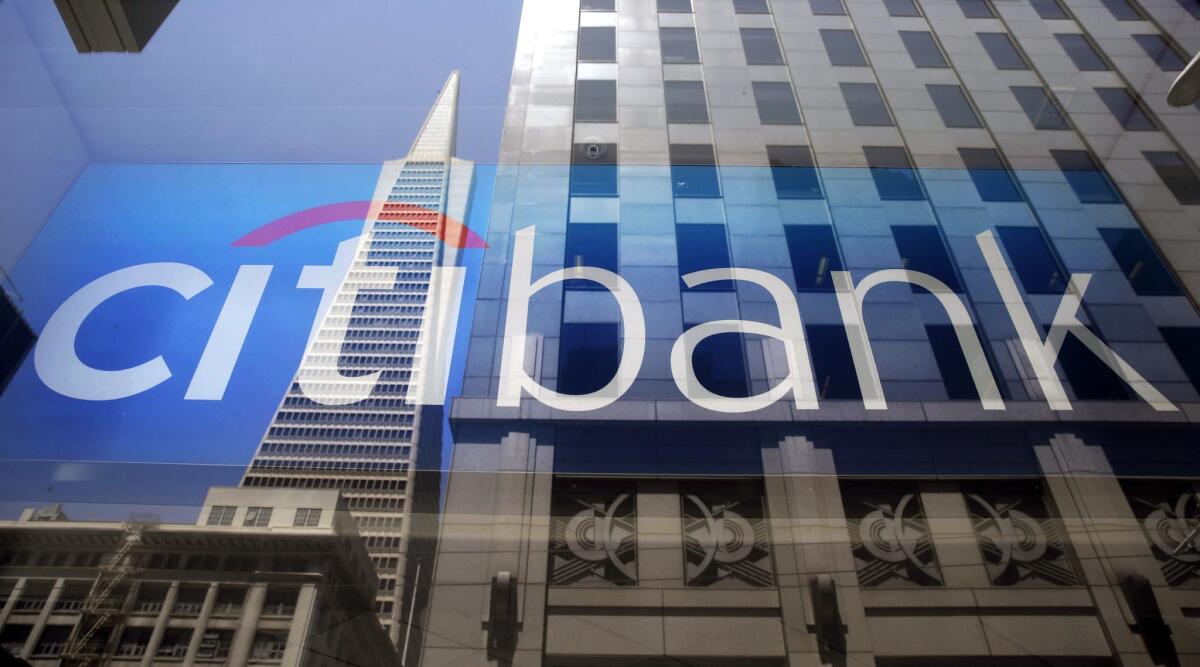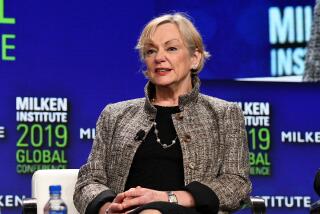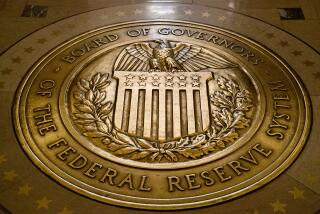Citigroup picks Jane Fraser as first female CEO of a major Wall Street bank

- Share via
Citigroup Inc. picked Jane Fraser as its next chief executive, placing the first woman atop a major Wall Street bank.
She will succeed Michael Corbat, who is retiring in February after more than eight years in the top job. Fraser, who was named the company’s president last year in a move that marked her as the heir apparent, has run the bank’s consumer unit, private bank and Latin American operations during her 16-year tenure.
The 53-year-old Scot joined Citigroup in 2004 after a decade as a McKinsey & Co. consultant. She will join Citi’s board immediately and take on the CEO role once Corbat retires, the New York bank said in a statement Thursday.
Now that she’s broken Wall Street’s thickest glass ceiling, Fraser’s next challenge will be to achieve what eluded her predecessors — and to do it in the wake of a pandemic.
For years, the expansive consumer and investment bank has repeatedly missed its own targets for boosting profitability, leaving it as the worst performer among the five Wall Street giants.
And despite big investments to bolster internal oversight, the company made headlines in August for mistakenly wiring $900 million to hedge funds that wouldn’t give it back. From Washington watchdogs to an activist shareholder, she’ll have to quell any doubts over whether the bank is on the right path.
That’s the setting for a drama that will probably captivate Wall Street for years: Will the first woman to run a giant U.S. bank conquer Citigroup’s most intractable challenges?
In tapping Fraser, the board is betting on an executive who already has experience running Citigroup’s strategic team, mortgage unit and consumer bank — areas that will take center stage as the lender faces loan defaults and other fallout from the COVID-19 pandemic.
Decades ago, she even co-wrote a book on the barriers companies must overcome to operate around the globe, which happened to include sections on the one she’s now set to lead.
Her appointment to CEO is “obviously welcome, but a mixed blessing given the challenges of managing these megabanks,” said Sheila Bair, a former chair of the U.S. Federal Deposit Insurance Corp. “I wish her the best. Maybe women can succeed where the men have failed. At least she will have her shot.”
That said, Citigroup is not a glass cliff, in which a woman is elevated to lead at a moment when defeat is probable. While announcing her ascent Thursday, the board applauded Corbat for the progress he’s made overhauling and simplifying the bank since its near collapse in the 2008 financial crisis. The company has returned more than $80 billion of capital to shareholders over the last six years.
“Corbat made Citi a better bank,” acknowledged Bair, who has long been a fierce critic of its bailout. Yet the obstacles that remain are formidable.
Citigroup’s profitability has long lagged its peers’. As the pandemic surged across the U.S. in April, the company abandoned a target for improving return on tangible common equity, a key measure of profitability, to between 12% and 13%. JPMorgan Chase & Co. and Bank of America Corp. boasted ratios of 17% and 15% at the end of last year, respectively.
Rivals have seen gains in large wealth and asset management units that rode the wave of a decadelong bull market, while Citigroup sold its brokerage to Morgan Stanley during the last crisis. And companies such as JPMorgan have seized on a strong U.S. consumer while Citigroup’s retail unit is more international.
More to Read
Inside the business of entertainment
The Wide Shot brings you news, analysis and insights on everything from streaming wars to production — and what it all means for the future.
You may occasionally receive promotional content from the Los Angeles Times.










